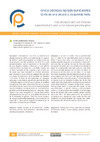Please use this identifier to cite or link to this item:
http://hdl.handle.net/10553/107071
| Title: | Cinco décadas no son suficientes. Carta de una abuela a su querida nieta | Other Titles: | Five decades are not enough. A grandmother´s letter to her beloved granddaughter | Authors: | Valdivielso Gómez, Sofía Esther | UNESCO Clasification: | 550607 Historia de la educación 580204 Niveles y temas de educación 630909 Posición social de la mujer |
Keywords: | Cambio educativo Política de la educación Identidad sexual Identidad de género Feminismo, et al |
Issue Date: | 2020 | Journal: | Cuestiones pedagógicas | Abstract: | Este texto es una carta. La carta de una abuela nacida en 1964 a su nieta nacida en agosto de 2020. A través de esta carta, se explica cómo fue la educación que ella recibió en los años 70 y qué acontecimientos fueron importantes en la transición de una España aislada y dictatorial a una abierta y democrática. Se hace con una doble mirada: por un lado, centrado en las mujeres y, por el otro, en las leyes que han solicitado al sistema educativo que introduzca en el currículo asignaturas que den a conocer el significado de la igualdad de mujeres y hombres. El texto se ha organizado por décadas para seguir una línea temporal que permita describir y analizar algunos hechos que explican la realidad compleja de este país. Entre esos hechos se analiza el impacto que los nuevos discursos sobre la identidad sexual y de género están teniendo en la sociedad en general y en el sistema educativo en particular. Estos nuevos discursos recogidos en nuevas leyes están desplazando el discurso de la igualdad de género al de la identidad de género. Todo ello en el contexto de una posmodernidad capitalista y narcisista que ha sustituido el plural por el singular, lo colectivo por lo individual o el derecho por el deseo. The text is a letter from a grandmother born in 1964 to her granddaughter born in August 2020. Through this letter, the grandmother tries to explain what the education she received in the seventies was like, as well as the events that took place during the transition from an isolated and dictatorial Spain to a democratic and open country. She does so from a double perspective. On the one hand, by focusing on women and, on the other, on the laws that have requested the educational system to introduce subjects into the curriculum that would highlight equality between men and women. The text has been structured over the decades to follow the lifeline that would allow the grandmother to describe and analyze some facts about the complex reality of the country. Among these facts, it examines the impact of the new discourses on gender identity in the education system. The new discourses reflected in the new laws move the gender discourse towards gender identity discourse. All of this takes place within the context of a capitalist and narcissistic post-modernity that has displaced the plural towards the singular, the collective towards the individual, and the right to desire. |
URI: | http://hdl.handle.net/10553/107071 | ISSN: | 0213-1269 | DOI: | 10.12795/CP.2020.i29.v2.05 | Source: | Cuestiones pedagógicas: Revista de ciencias de la educación [ISSN 0213-1269], v. 2 (29), p. 64-75 |
| Appears in Collections: | Artículos |
Items in accedaCRIS are protected by copyright, with all rights reserved, unless otherwise indicated.
